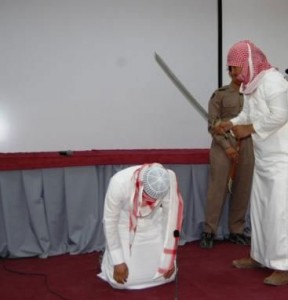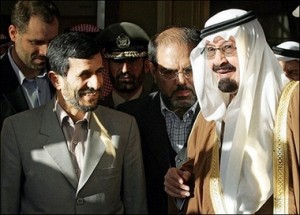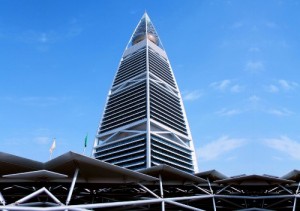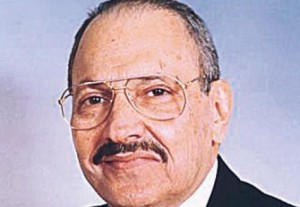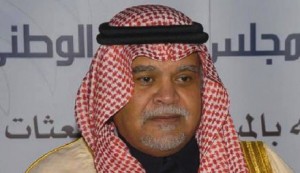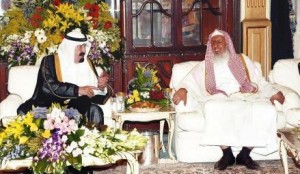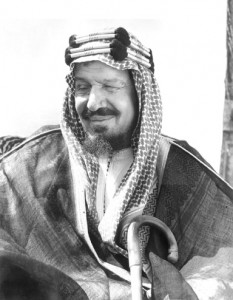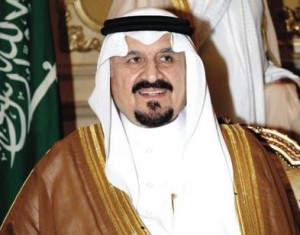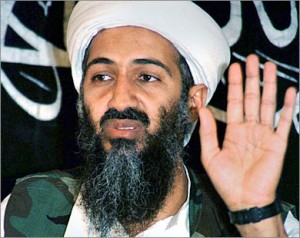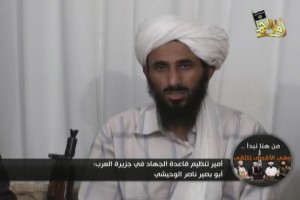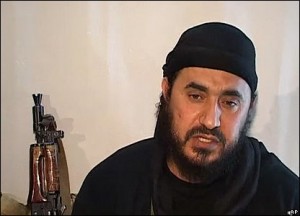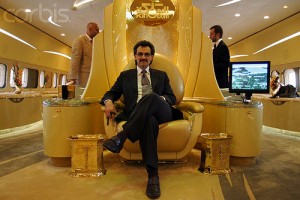
Nothing can justify the heinous terrorist attacks of Sept. 11. Yet, some feel that U.S. policies have acted as the equivalent of poking hornets’ nests, turning Americans into targets for violence at home and abroad. Demanding reconsideration, therefore, is the promiscuous foreign intervention that has helped generate not just abstract hatred, but hostile passions intense enough to cause people to hijack airplanes and fly them into buildings full of innocent people.
One of the worst aspects of U.S. foreign policy has been the tendency to prop up “friendly” autocratic regimes. Among Washington’s more-dubious allies is Saudi Arabia, a corrupt totalitarian regime at sharp variance with America’s most cherished values, including religious liberty.
The House of Sand has long leaned toward the West. Saudi Arabia grew out of the World War I defeat of the Ottoman Empire, an ally of the Central Powers, at the hands of Great Britain and various subject Arab peoples. King Abdul al-Aziz al-Saud, who briefly fought against the Turks and then defeated the Hashemite Dynasty and allied Arab families to take control of the bulk of the Arabian Peninsula, proclaimed the modern Saudi Arabia in 1932. King Abdul al-Aziz, who fathered 44 sons before dying in 1953, was the fount of today’s royal family. His son, pro-American King Fahd bin Abdul Aziz, suffered a series of strokes beginning in 1995, leaving another son, Crown Prince Abdullah bin Abdul Aziz, largely running the government.
Saudi Arabia would be unimportant to the U.S. were it not for the massive oil deposits sitting beneath its seemingly endless deserts. The advent of an activist Organization of Petroleum Exporting Countries (OPEC), led by Saudi Arabia, which supported the oil embargo of 1973-74 against America, helped to raise oil prices and enrich the Saudi monarchy. Tensions with the West grew, and, for a time, a few analysts even advocated invading the Persian Gulf region to seize the oil. The latest round of worrying about Saudi stability has led some people to recycle that idea.
However, in the post-World War II era, U.S. policymakers have focused primarily on defending the Gulf region from other potential invaders-the Soviet Union during the Cold War, the Islamic revolutionaries who seized control of Iran in 1979, and, most recently, Iraq’s Saddam Hussein. To deter Moscow, Pres. Jimmy Carter created a rapid deployment force; to block Tehran, the Reagan Administration aided Iraq in its bloody and lengthy war against Iran.
Finally, America went to war with Iraq, with preservation of the House of Sand of far more concern than the liberation of Kuwait, the formal public goal. The U.S. and its allies easily defeated Iraq, but left Saddam in power. Ten years of desultory United Nations weapons inspections, economic embargo, “no-fly zones,” and frequent U.S. bombing followed.
America backed its military units in Turkey and carrier forces in the Persian Gulf with about 5,000 Air Force personnel in Saudi Arabia as part of the Southern Watch command, comprising aircraft ranging from F-15s and F-16s to C-130s and KC-135s. Another 1,300 military personnel and civilian contractors worked with the Saudi National Guard. No mere temporary response to Saddam’s aggression, America’s presence has a “permanent feel,” as Howard Schneider of the Washington Post put it in May, 2001.
Although the relationship between Riyadh and Washington is close, it has rarely been easy. For American administrations that loudly promote democracy, the alliance with Saudi Arabia has been a deep embarrassment. As the Human Rights Watch reported in 2001, “Freedom of expression and association were nonexistent rights, political parties and independent local media were not permitted, and even peaceful anti-government activities remained virtually unthinkable. Infringements on privacy, institutionalized gender discrimination, harsh restrictions on the exercise of religious freedom, and the use of capital and corporal punishment were also major features of the kingdom’s human rights record.”
Repression and corruption. Saudi Arabia is an absolute monarchy, an almost medieval theocracy, with power concentrated in the hands of senior royalty and wealth concentrated among some 7,000 al-Saud princes (or more, by some estimates). Political opposition and even criticism are forbidden. In practice, there are few procedural protections for anyone arrested or charged by the government. The semiautonomous religious police, or Mutawaa’in, intimidate and detain citizens and foreigners alike. The government may invade homes and violate privacy whenever it chooses, and travel is limited. Women are covered, cloistered, and confined, much as they were in Afghanistan under the Taliban.
The Saudi regime’s apologists, such as Abdulrahman al-Zamil, a member of the official 120-member Shoura (Advisory) Council, consider the lack of popular accountability a virtue, arguing that it ensures selection “unrelated to the influence of special interest groups and financial contributions.” Ultimate control, though, rests with the 75,000-man National Guard (run by the Crown Prince), which is as large as the army, not with any group of advisors. Command positions are reserved for the royal family, thereby strengthening its influence and creating further resentments. “Nobody climbs up into the higher ranks,” one Saudi complained to the Wall Street Journal in November, 2001. “Those are reserved for the royal family.”
It is perhaps no surprise that such a regime has an unenviable reputation for corruption. Western business partners are occasionally imprisoned to resolve disputes. The problem is so great that the Saudi ambassador to the U.S., Prince Bandar bin Sultan, has acknowledged tens of billions of dollars in abuse and theft. Indolence is even more widespread. For years, every college graduate could expect a government position that provided a good salary (and many tea breaks) for little effort. More than a quarter of Saudi Arabia’s nearly 23,000,000 people are expatriates, many of whom are domestic workers. During the Gulf War, many Saudis expected others to do the dirty work of military combat, likening America’s presence to hiring mercenaries.
Religious totalitarianism. Most ugly, however, is the religious totalitarianism enforced by Riyadh. Citizens and foreigners alike are prohibited from engaging in non-Muslim worship as well as proselytizing. According to former foreign service officer Tim Hunter, fired by the State Department for his criticism of its timidity in dealing with the Saudis, Christian clerics, if discovered, are arrested, beaten and brutalized, and eventually expelled from the country. Conversion means apostasy, which is punishable by death. Private devotion is theoretically allowed, but homes are raided if worshippers gather together. Christians have also been punished for blasphemy. In this regard, Saudi Arabia follows much of the same policy as the Taliban (which Riyadh recognized and funded until recently), that was assailed by Pres. Bush for prosecuting foreign aid workers Who were accused of proselytizing.
Thuggish behavior alone is rarely enough to preclude diplomatic relations, but it should discourage the U.S. from affirmatively embracing the Saudi regime, even in the name of stability. After all, repression is not the only path to security. Saudi Arabia’s neighbor Kuwait has gained legitimacy by creating an elected legislature and considering giving women the vote, while Bahrain plans on holding parliamentary elections in 2003, a move that, in the words of analyst Joseph Shattan, “appears to have seriously blunted the anti-American rage that is currently sweeping through the rest of the Arab world.” In fact, the quick dissipation of fundamentalist street protests during the war in Afghanistan would appear to offer a propitious moment for Arab governments to adopt political reforms. Those autocratic regimes should be strong enough to risk reaching for long-term stability through democratic means.
American policies have identified Washington with the Saudi kleptocracy. As Richard Perle of the American Enterprise Institute observes, “We are associated with regimes that are corrupt and illegitimate.” Many average Saudis believe the U.S. is either serving as a pillar of the regime or taking advantage of its position to profit from the Gulf War. This has generated anger against America and support for sending home its troops, as well as the feeling that terrorism against the U.S. is legitimate. That phenomenon was evident after the bombing of the Khobar Towers military barracks in 1996, as well as after Sept. 11.
Americans are paying for Washington’s cozy ties with Riyadh. That association has made the U.S. a target of terrorists. Obviously, one must take Saudi-born terrorist Osama bin Laden’s pronouncements with some grains of salt, but ending Washington’s support for the corrupt regime in Riyadh and expelling American forces from the Persian Gulf region appear to be his main goals. Since he lacks missiles, bombers, and carrier groups to achieve his end, he instead relies on terrorism.
Growing internal problems. The Saudi ruling elite is paying for its repression and links to Washington, especially when contrasted with its formalistic Muslim piety. With 70% of government revenues (and 40% of gross domestic product) derived from oil sales, the drop in energy prices since the early 1980s has caused economic pain in Saudi Arabia; per capita GDP has dropped from $28,600 in 1981 to less than $7,000 today. Unemployment is estimated at 15% overall and 20% for those under 30. That has helped generate deep undertones of unrest, but the discontented feel helpless to promote political change. Any criticism tends to be expressed through religious leaders. Novelist Abdelrahman Munif warns that the “situation produces a desperate citizenry, without a sense of dignity or belonging.” As Neil MacFarquhar of The New York limes observed in November, 2001, “In another country Mr. bin Laden might have become an opposition politician rather than a holy warrior. But Saudi Arabia brooks no dissent.”
Senior clerics live well on the government payroll and therefore lack credibility. Radical freelancers have developed a widespread following. Fifteen of the 19 hijackers of Sept. 11 were from Saudi Arabia, and in January, 2002, Riyadh acknowledged that about 100 of the 158 alleged Al Qaeda prisoners being held at Guantanamo Bay were Saudi citizens. One Saudi businessman told the Wall Street Journal: “Many young people are disgruntled and disenchanted with our society’s openness to the West and U.S. foreign policy. These people are frustrated and have nothing to do. They fall prey to people with agendas of their own. They are time bombs. They’re like the Japanese kamikaze.” With roughly half of the population under the age of 15, the potential for further unrest is substantial.
Soaring dissatisfaction with the regime due to slumping revenues and a slowing economy has merged with criticism of America. Numerous Saudis are angry about U.S. support for the House of Saud, and many students irrationally blame America for Saudi Arabia’s economic woes. Additional irritants include Washington’s support of Israel, attacks on Iraq (which are paradoxically seen as anti-Muslim now, a decade after that nation’s defeat), and the invasion of Afghanistan. Admiration for bin Laden is evident even among those who dislike his austere Islamic vision. Richard Murphy, a onetime U.S. ambassador to Saudi Arabia currently with the Council on Foreign Relations, worries that, “After 11 years, we’ve worn out our welcome on the popular level, though not with the leadership.”
Saudi obstructionism
The Saudi leadership has proved wary of aiding the U.S. despite direct attacks on Americans. The 1996 bomb attack on the Khobar Towers barracks in Dharan killed 19 Americans and wounded 372. It was the work of radical Islamists, who, like bin Laden, view Riyadh’s alliance with America as a defilement of holy lands. U.S. efforts to investigate the bombing were hamstrung by the Saudis, who refused to turn over relevant information or to extradite any of the 13 Saudis indicted by an American grand jury.
In the same year, the Saudis refused, despite U.S. urging, to take custody of bin Laden from Sudan. In 1998, he and several other extremist Muslim leaders issued a manifesto calling for a holy war to drive the U.S. from Islamic lands. Even so, American officials were unable “to get anything at all from King Fahd” to challenge bin Laden’s financial network, charged John O’Neill, a former FBI official involved with counterterrorism who died in the attack on the World Trade Center, where he was security chief.
Riyadh’s reluctance to risk popular displeasure by identifying with Washington continues, even after the deaths of several thousand Americans on Sept. 11. Observes Daniel Pipes, director of the Middle East Forum: “In 1979, when a group of extremists took over the Mecca Mosque, the Saudi regime called in French troops, infidels to go into Mecca and take it over. [In] 1990, when Saddam Hussein threatened, they called us in and we protected them. Now it’s our turn to call. We’re the ones who lost [more than 3,000] dead. We need them, they’ve got to be there.”
Privately, White House aides acknowledge that Saudi officials have not been as cooperative as the U.S. hoped. Riyadh has refused to run “traces,” involving background investigations, on its 15 citizens who committed the atrocities of Sept. 11, supply passenger lists of those on flights to America, and block terrorist funds flowing through supposed charities. (If the money goes awry, the regime explains, it does so outside of Saudi Arabia.) Riyadh has also pressed non-OPEC nations to cut oil production in an attempt to raise prices to buttress the cartel of which it is the leading member. It is no surprise, then, that Riyadh seemed to be one of the targets of Bush’s November, 2001, address to the UN General Assembly when he called for moving from “sympathy” to “action.” Publicly, however, Administration officials, including the President, laud Saudi cooperation.
The Saudis are, it is true, allowing use of the operations center at Prince Sultan Air Base, near Riyadh, but Saudi Arabia has joined its neighbors in attempting to keep its distance, ostentatiously announcing that no foreign troops would use Saudi facilities to stage attacks. One reason is concern about America’s strong support for Israel, but, more generally, Riyadh fears identifying with the U.S. By early November, 2001, some Saudi officials were at least willing to blame the Taliban and not America for civilian casualties in Afghanistan, though the Saudis failed to join other governments in marking the three-month anniversary of the terrorist attacks. Still, one anonymous official asked, “Does it matter what we are saying publicly?” Just as cooperation with the West generates unrest, the refusal to defend cooperation with the West aggressively encourages extremist sentiments to grow.
The lack of a public endorsement pales in comparison with Riyadh’s support for the very Islamic fundamentalism that threatens to consume the regime in Riyadh as well as to murder more Americans in future terrorist attacks. Al-Zamil criticized the U.S. for aiding Afghan guerrillas only in their fight against the Soviet Union, as if Washington could have subsequently imposed order on a land rent by warring, fratricidal factions, maintaining that “The Saudi volunteers, pure at heart and committed to high principles, could understand neither the opportunism nor pragmatism of U.S. foreign policy.” It is a curious criticisen for a Saudi official, given the rank opportunism and pragmatism of Saudi policy. Al-Zamil admits that “the U.S. military presence is very unpopular throughout Saudi society and is a liability rather than an asset,” raising questions about why American military personnel are there-other than as pragmatic protection from Iraq and perhaps Iran.
As MacFarquhar has observed in the Times, a charity telethon designed to channel funds to the families of Palestinian suicide bombers “perfectly mirrored the government’s way of doing business: throw money at nasty problems and leave the unpleasant details under the rug.” Riyadh’s strategy is to buy off everyone. It long subsidized Arab governments and guerrilla movements at war with Israel, and it opposed the 1979 peace treaty between Egypt and Israel. The regime was, along with Pakistan, the primary financial backer of the Taliban in Afghanistan, which provided sanctuary for bin Laden and his training camps. It is widely believed that even Saudi businessmen unsympathetic to his goals have made contributions to bin Laden in an attempt to purchase protection. There are serious charges of financial support from some members of the Saudi royal family itself for bin Laden’s Al Qaeda network.
The problem goes even deeper. The Saudi state, run by royals who often flaunt their libertinism, enforces the extreme Wahhabi form of Islam at home and subsidizes its practice abroad. Wahhabism derives from the practices of a fundamentalist 18th-century tribal leader whose followers helped the Saudi royal family consolidate power in the early 1900s. The practice is thought to dominate as many as 80% of the mosques in America. Within this sect, hostile to modernity, political extremism and support for terrorism have flourished in Saudi Arabia.
Moreover, the threat reaches beyond the Middle East to Indonesia, Malaysia, and the Philippines. According to The New York Times, Riyadh “has also sponsored the fundamentalist academies known as madrassa in Pakistan. Many graduates of these madrassa have headed straight to Afghanistan, some to bin Laden training camps.”
In short, “these are SOBs who are barely even our SOBs,” complains National Review editor Rich Lowry. By any normal assessment, Americans should care little if the House of Saud fell, as have other illegitimate monarchies such as Iran’s Peacock throne, except for one thing: Saudi Arabia has oil. Quoted in Forbes in November, 2001, Saudi oil expert Nawaf Obaid worries that, if it fell to a fundamentalist revolution, the resulting government would be “ten times more powerful [than] Iraq or Iran.”
Contrary to popular wisdom, the Saudis’ trump card is surprisingly weak. Tree, with 262,000,000,000 barrels in proven reserves, Saudi Arabia has about one-quarter of the world’s resources and 8.7 times America’s supplies. Riyadh is not only the world’s leading supplier, but, as a low-cost producer, it can easily augment its daily exports, that totaled 9,100,000 barrels a day in 2001.
However, the reserves figure vastly overstates the importance of Middle Eastern oil to the U.S. (and Western) economy. Saudi Arabia accounted for about 12.3% of global production in 2000 (and closer to 10% in 2001); Riyadh plus Kuwait and the various sheikdoms came to 21.3%; and OPEC as a whole produced 41.5% of the world’s oil supplies.
By one estimate, zero Mideast production would push prices to $76 a barrel. The result in such a worst-case scenario would be severe economic pain in the short term, though the Strategic Petroleum Reserve, which Bush has vowed to fill, would help moderate prices. With a one percent supply reduction estimated to influence a 10% price rise, zero Saudi production would push prices to $42 a barrel-a high, but hardly catastrophic, level. Moreover, the U.S. has survived high prices in the past. Between 1974 and 1985, real gasoline prices ranged between 1.4 and 2.3 times current prices.
The myth of the oil weapon
Were the Saudi regime to fail, prices would rise substantially only if the conqueror, whether internal or external, kept the oil off the market. That would be true especially if the other states in the region did not collapse as well.
Withholding oil, though, would defeat the very purpose of conquest, even for a fundamentalist regime. After all, the Iranian revolution did not cause Iran to stop exporting oil; production increased every year from 1990 to 1998 and rose again in 2000, almost returning to 1998 levels. In fact, even bin Laden urged his followers in late 2001 via videocassettes not to damage Saudi oil wells since oil is the source of Arab power.
If a new regime did halt sales, the primary beneficiaries would be other oil producers, who likely would increase exports in response to higher prices. A targeted boycott of only the U.S. would be ineffective, since oil is a uniform product available around the world. In fact, the embargo of 1973-74 had little impact on production. The global recession of 1975 caused a far-more-noticeable drop.
A new regime might decide to pump less oil in order to raise prices. Such a strategy would require international cooperation, yet the oil producers have long found it difficult to coordinate price hikes and limit cheating on agreed-upon quotas. Even if effective, restricting sales would have just a limited impact. A decade ago, when oil was selling for about $20 a barrel, David R. Henderson, former senior energy economist with Pres. Ronald Reagan’s Council of Economic Advisers and now with the Hoover Institution, calculated that the worst result of an Iraqi seizure of the Saudi oil fields would be about a 50% price increase, which would cost the U.S. economy approximately one-half of one percent of GDP.
In any case, the economic impact would decline over time. Countries such as Kuwait, Iran, Nigeria, Russia, and the United Arab Emirates have the ability to pump significantly more oil than they are currently producing. As economist Susan Lee puts it, should Riyadh turn off the pumps, “the U.S. would find itself plenty of new best friends.”
Sharply higher prices would bring forth new energy supplies elsewhere. Total proven world oil reserves were 660,000,000,000 barrels in 1980, 1.009 trillion in 1990, and 1.046 trillion at the end of 2000. Yet, in the last decade alone, the world’s people consumed 250,000,000,000 barrels of oil. How could this be? A combination of new discoveries and technological advances increased the amount of economically recoverable oil. Reserves rose even as oil prices dropped. Between 1980 and 1990, proven oil reserves jumped by 62%, while prices for Middle Eastern petroleum were falling 43%. Prices eventually hit a dramatic low in 1998, down another 41%, before rising over the next two years.
America’s oil options. The U.S. is dotted with high-production-cost wells that could be unplugged. The nation’s outer continental shelf alone is thought to contain more than current proven reserves, though, since so little of the outer continental shelf-barely six percent-has been leased, those resources have not been proved. Some 15,000 acres of the 19,600,000-acre Arctic National Wildlife Refuge could contain a similar amount of oil (as well as supplies of natural gas). Even the modest estimate of 5,000,000,000 barrels of recoverable reserves would be a significant addition to current supplies. However, it won’t be known how much is there without drilling, which could be conducted in an environmentally sensitive manner. Although some people might think the desire to lower the cost of gasoline an inadequate reason to develop those supplies, the prospect of terrorism and war related to America’s access to Persian Gulf oil should change the cost/benefit ratio considerably.
Further, approximately 300,000,000,000 barrels of unrecovered oil-10 times our proven reserves and more than known Saudi resources-lie in beds of shale under the U.S. They are not counted because they are not currently worth developing, but, as prices rise and new techniques are developed, they may become economically recoverable.
Moreover, energy companies are looking for new oil deposits around the world, including in the Caspian Basin, Russia, and West Africa. Estimates of as yet undiscovered potentially recoverable oil range from one trillion to six trillion barrels. The Energy Information Administration estimates that, at current consumption rates, we have enough oil for another 230 years and that “unconventional” sources, such as shale, could last 580 years. Even those figures are based on existing prices and technologies. Higher prices would stimulate exploration, as well as production of alternative fuels and conservation, reducing oil consumption.
In short, an unfriendly Saudi Arabia might hurt America’s pocketbook, but would not threaten America’s survival. Different would be the ascension of a truly terrorist regime, one dedicated to using oil revenues to undertake a campaign against the U.S. That is unlikely, however, if for no other reason than that Washington’s campaign against Afghanistan demonstrates that, in such a case, the new ruling elites would not long remain the new ruling elites. (Control of the Gulf region by a hegemonic rival, notably the Soviet Union, would have posed a significantly different, and greater, security threat, but that prospect disappeared with the end of the Cold War.)
Although in an unlikely worst case (the loss of most Persian Gulf oil) the cost hike might be significant, that risk must be balanced against the annual cost of maintaining forces to protect Saudi oil, estimated at $50,000,000,000. On top of that come the expenses of fighting terrorism, exacerbated by U.S. support for Saudi Arabia. The war in Afghanistan costs at least $1,000,000,000 a month, and then there are the likely civilian casualties from future attacks should the war on terrorism fail or prove just partially successful.
Severing the tie
Mentioning Saudi Arabia’s shortcomings or suggesting that the regime’s survival is not vital to the U.S. makes policymakers in Washington and Riyadh nervous. In particular, the House of Saud doesn’t take criticism well. Crown Prince Abdullah denounced the American media in a speech on state television, charging that they were damaging his nation’s reputation and driving a wedge between his government and Washington. In the Arab News, he blamed the American media campaign for expressing “its hatred toward the Islamic system.” His government diplomatically suggested that Riyadh’s problems were with the press, not the Bush Administration. (In November, 2001, the Saudi government bought a four-page advertisement in leading newspapers extolling the accomplishments of King Fahd, “a doyen of world statesmen.”)
In fact, there are rumors that policymakers in Riyadh, worried about domestic criticism of their ties to Washington, are considering ending America’s military presence. That naturally has been denied by Saudi and U.S. officials alike, but serious tensions obviously remain. In his letter to the President, Crown Prince Abdullah wrote, “It is time for the U.S. and Saudi Arabia to look at their separate interests.” Al-Zamil suggested that “Saudi Arabia might well find it necessary to reassess its 70-year special relationship with the United States,” including pulling its students out of American universities, withdrawing financial investments from the U.S., and “playing a different role within OPEC.”
Those are empty threats, however, since America would not notice the departure of Saudi university students, and arbitrarily pulling out investments would hurt Saudi Arabia more than the U.S. Moreover, even in the aftermath of Sept. 11, Riyadh was lobbying non-OPEC oil producers to cut production, to America’s detriment. The House of Saud sets, and will continue to set, oil production on the basis of Saudi, not American, interests.
Washington should take the initiative. The country that should reassess the current Washington-Riyadh axis is the U.S. As Boston Globe columnist Jeff Jacoby observed on Nov. 18, 2001, “For years the United States has had an arrangement with Saudi Arabia’s rulers: They would sell us oil and we would pretend not to notice that they were intolerant dictators who crashed dissent at home while nurturing some of the world’s most violent fanatics abroad. But now we are at war with those fanatics and the old bargain cannot continue.”
Senate Armed Services Committee Chairman Carl Levin (D.-Mich.) has broken with the Washington consensus to make much the same point. The American commitment to the Saudi royal family is a moral blemish and a practical danger. It has already drawn the U.S. into one conventional war and has helped make Americans targets of terrorism, which generated far more casualties in one day than did the Gulf War, Kosovo conflict, and Afghanistan campaign (so far) combined.
The most important reason to withdraw U.S. troops is to eliminate a source of antagonism that has fostered the sort of virulent terrorism seen on Sept. 11. Nevertheless, Washington can ill afford to cite that as its justification, and it cannot pull out precipitously, lest the lesson learned abroad is that the way to change U.S. foreign policy is to slaughter innocent Americans.
Nevertheless, America has ample reason to make such a change on other, public grounds-Saudi Arabia is an authoritarian regime that has simultaneously fostered terrorism abroad and undercut long-term stability at home. The survival of the House of Saud should be left to itself.
Saudi Arabia’s oil is important, but who sells it to America is not. Indeed, although stability in the Persian Gulf is of value, the benefits of the U.S.’s presence are not so obvious. It is not clear that it increases Saudi stability. It is certain that the royal family will do whatever it takes to maintain its power and privileges against internal opposition. As analyst Simon Henderson puts it, “The House of Saud will be ruthless in preserving itself.” If that ruthlessness is inefficient, the American presence’ is not likely to help, unless the U.S. is prepared to commit ground forces-in addition to those presently on station-to prop up the monarchy, creating the prospect of a lengthy occupation and increased terrorist activity.
Of greater concern is the possibility of renewed external aggression, most obviously by Iraq, though it remains in a greatly weakened condition. Even before Sept. 11, the Gulf states were working to resolve conflicts and improve their ability to defend themselves without Washington’s help. Saudi Arabia spends more on its military than do Iran and Iraq combined, and the Gulf Cooperation Council, made up of Bahrain, Kuwait, Oman, Qatar, Saudi Arabia, and the United Arab Emirates, has a larger population than Iraq, but has yet to field a comparable military. The prospect of American disengagement would, like the prospect of a hanging, help concentrate the mind. Such a prospect would also increase pressure on the Gulf states to forge defensive relationships with surrounding powers-most notably Iran, Syria, and Turkey-and to inaugurate serious political reform to generate a popular willingness to defend the incumbent regimes.
If it fails to act, however, the U.S. shouldn’t worry unduly about the future of the Saudi regime. As National Review’s Lowry observes, “Dealing with these allies will require more cold-bloodedness and calculation than the U.S. has been capable of since the height of the Cold War.” Although Lowry opposes withdrawal of U.S. troops, that is the logical result of cold-blooded analysis. Badgering the Saudis to be more cooperative and to democratize, as has been proposed, is unlikely to succeed, since they would have done so already if they thought it was in their interest.
Expanding America’s military, going to war, and risking civilian casualties as a result of terrorism in order to defend Riyadh costs far more than stability in the Gulf region is worth. Forcibly ousting the House of Sand and imposing a puppet regime, whatever such a strategy’s apparent short-term virtues, would further entangle the U.S. in a virulent, hate-filled region made even more volatile by America’s action. The hysterical international reaction, by friend and foe alike, can easily be imagined.
Should the House of Saud fall or be overrun, Washington would finally be relieved of the moral dead weight of defending that regime. Consumers almost certainly would continue to purchase sufficient oil, if not directly from a hostile Saudi regime, then from other producers in a marketplace that would remain global. Americans would adjust to any higher prices by finding new supplies, developing alternative energy forms, and reducing consumption.
There were many causes of the Sept. 11 atrocity. Some, such as America’s status as a free society whose influence permeates the globe, reflect the country’s very being and cannot and should not be changed. Others-such as Washington’s willingness to make common cause with the morally decrepit, theocratic monarchy in Riyadh-would be of only dubious benefit even if they did not put Americans at risk. The U.S. must not retreat from the world, but it should stop intervening militarily and supporting illegitimate and unpopular regimes where its vital interests are not involved, as in Saudi Arabia.
Doug Bandow is a senior fellow at the Cato Institute, Washington, D.C.






